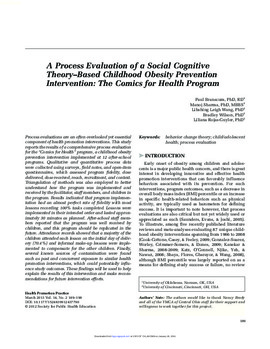| dc.contributor.author | Paul Branscum | |
| dc.contributor.author | Manoj Sharma | |
| dc.contributor.author | Lihshing Leigh Wang | |
| dc.contributor.author | Bradley Wilson | |
| dc.contributor.author | Liliana Rojas-Guyler | |
| dc.date.accessioned | 2016-01-14T19:53:42Z | |
| dc.date.accessioned | 2016-03-30T15:32:45Z | |
| dc.date.available | 2016-01-14T19:53:42Z | |
| dc.date.available | 2016-03-30T15:32:45Z | |
| dc.date.issued | 2013-03-01 | |
| dc.identifier.citation | Branscum, P., Sharma, M., Wang, L. L., Wilson, B., & Rojas-Guyler, L. (2013). A Process Evaluation of a Social Cognitive Theory–Based Childhood Obesity Prevention Intervention: The Comics for Health Program. Health Promotion Practice, 14(2), 189-198. doi: 10.1177/1524839912437790 | en_US |
| dc.identifier.uri | https://hdl.handle.net/11244/25398 | |
| dc.description.abstract | Process evaluations are an often overlooked yet essential component of health promotion interventions. This study reports the results of a comprehensive process evaluation for the “Comics for Health” program, a childhood obesity prevention intervention implemented at 12 after-school programs. Qualitative and quantitative process data were collected using surveys, field notes, and open-item questionnaires, which assessed program fidelity, dose delivered, dose received, reach, recruitment, and context. Triangulation of methods was also employed to better understand how the program was implemented and received by the facilitator, staff members, and children in the program. Results indicated that program implementation had an almost perfect rate of fidelity with most lessons recording 100% tasks completed. Lessons were implemented in their intended order and lasted approximately 30 minutes as planned. After-school staff members reported that the program was well received by children, and this program should be replicated in the future. Attendance records showed that a majority of the children attended each lesson on the initial day of delivery (70.4%) and informal make-up lessons were implemented to compensate for the other children. Finally, several known sources of contamination were found such as past and concurrent exposure to similar health promotion interventions, which could potentially influence study outcomes. These findings will be used to help explain the results of this intervention and make recommendations for future intervention efforts. | en_US |
| dc.language.iso | en_US | en_US |
| dc.publisher | Health Promotion Practice | |
| dc.subject | behavior change theory | en_US |
| dc.subject | child/adolescent health | en_US |
| dc.subject | process evaluation | en_US |
| dc.title | A Process Evaluation of a Social Cognitive Theory–Based Childhood Obesity Prevention Intervention: The Comics for Health Program | en_US |
| dc.type | Research Article | en_US |
| dc.description.peerreview | Yes | en_US |
| dc.description.peerreviewnotes | https://us.sagepub.com/en-us/nam/manuscript-submission-guidelines | en_US |
| dc.identifier.doi | 10.1177/1524839912437790 | en_US |
| dc.rights.requestable | false | en_US |
